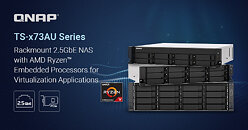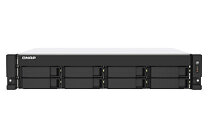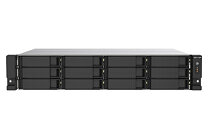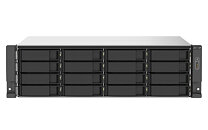QNAP Systems Inc, a leading computing, networking, and storage solution innovator, unveiled the rackmount TS-x73AU NAS Series with high-performance and energy-efficient AMD Ryzen Embedded V1000 series V1500B 4-core/8-thread, 2.2 GHz processors.
With dual-port 2.5 GbE transmission and the ability to natively host virtual machines and containers while performing as an all-in-one server protected by key snapshot and backup technologies, the Ryzen CPU-powered TS-x73AU Series meets the most-demanding needs of enterprises. With PCIe expansion, additional functions can be added to the TS-x73AU Series (including 10 GbE, M.2 SSD caching or Fibre Channel support). The TS-x73AU Series is available in 8, 12 and 16-bay models with single and redundant power supply options.




"The TS-x73AU is QNAP's first SMB NAS that adopts high-performance 'Zen'-core AMD Ryzen embedded processors," said Jason Hsu, Product Manager of QNAP. "With flexible I/O expandability and versatile QTS applications for backup/sync, cloud gateways, virtualization, surveillance and security management, the TS-x73AU is a supremely cost-effective NAS solution for SMBs with budget limitations working within varied multi-tasking environments."
"We are excited to see QNAP utilize the powerful AMD Ryzen Embedded V1000 processor series to support its new series of NAS systems," said Surya Hotha, senior director, Embedded Product Marketing, AMD. "This system showcases that the Ryzen Embedded ecosystem is continuing to grow with new platforms and systems that take advantage of the flexible I/O and performance capabilities of the processor."
The TS-x73AU supports AES-NI encryption, SATA 6 Gb/s drives and up to 32 GB dual-channel DDR4 RAM. With one PCIe Gen3 x8 or two PCIe Gen3 x4 slots, expansion cards can be installed in the TS-x73AU to enhance core functionality. If high-speed networking is required, a 5 GbE/10 GbE network card can be installed. Users with VMware ESXi servers can install a QXG-10G2SF-CX4 PCIe 10 GbE Adapter with Mellanox ConnectX-4 embedded to add iSER (iSCSI Extension for RDMA) support. M.2 SSD caching can be added by using a QM2 card to accelerate IOPS performance. Graphics processing or GPU-intensive applications can be enabled by installing a graphics card. Users with Fibre Channel infrastructure can install a QNAP 16 Gb Fibre Channel card to use the TS-x73AU as a SAN storage device.
The TS-x73AU Series supports advanced business features to optimize management efficiency while ensuring continuous operation and security, including local/remote/cloud backup, Google G Suite and Microsoft 365 backup and cloud storage gateways. Block-based snapshots ensure data protection and instant restoration, and can help users protect their data from encryption-based virus threats. As storage demands grow, the TS-x73AU can be expanded by connecting a QNAP SAS, PCIe to SATA or USB storage expansion enclosure or by using VJBOD to utilize the unused storage capacity of other QNAP NAS.
Key Specifications
Redundant power supply models:
Single power supply model:
Video Announcement
View at TechPowerUp Main Site
With dual-port 2.5 GbE transmission and the ability to natively host virtual machines and containers while performing as an all-in-one server protected by key snapshot and backup technologies, the Ryzen CPU-powered TS-x73AU Series meets the most-demanding needs of enterprises. With PCIe expansion, additional functions can be added to the TS-x73AU Series (including 10 GbE, M.2 SSD caching or Fibre Channel support). The TS-x73AU Series is available in 8, 12 and 16-bay models with single and redundant power supply options.




"The TS-x73AU is QNAP's first SMB NAS that adopts high-performance 'Zen'-core AMD Ryzen embedded processors," said Jason Hsu, Product Manager of QNAP. "With flexible I/O expandability and versatile QTS applications for backup/sync, cloud gateways, virtualization, surveillance and security management, the TS-x73AU is a supremely cost-effective NAS solution for SMBs with budget limitations working within varied multi-tasking environments."
"We are excited to see QNAP utilize the powerful AMD Ryzen Embedded V1000 processor series to support its new series of NAS systems," said Surya Hotha, senior director, Embedded Product Marketing, AMD. "This system showcases that the Ryzen Embedded ecosystem is continuing to grow with new platforms and systems that take advantage of the flexible I/O and performance capabilities of the processor."
The TS-x73AU supports AES-NI encryption, SATA 6 Gb/s drives and up to 32 GB dual-channel DDR4 RAM. With one PCIe Gen3 x8 or two PCIe Gen3 x4 slots, expansion cards can be installed in the TS-x73AU to enhance core functionality. If high-speed networking is required, a 5 GbE/10 GbE network card can be installed. Users with VMware ESXi servers can install a QXG-10G2SF-CX4 PCIe 10 GbE Adapter with Mellanox ConnectX-4 embedded to add iSER (iSCSI Extension for RDMA) support. M.2 SSD caching can be added by using a QM2 card to accelerate IOPS performance. Graphics processing or GPU-intensive applications can be enabled by installing a graphics card. Users with Fibre Channel infrastructure can install a QNAP 16 Gb Fibre Channel card to use the TS-x73AU as a SAN storage device.
The TS-x73AU Series supports advanced business features to optimize management efficiency while ensuring continuous operation and security, including local/remote/cloud backup, Google G Suite and Microsoft 365 backup and cloud storage gateways. Block-based snapshots ensure data protection and instant restoration, and can help users protect their data from encryption-based virus threats. As storage demands grow, the TS-x73AU can be expanded by connecting a QNAP SAS, PCIe to SATA or USB storage expansion enclosure or by using VJBOD to utilize the unused storage capacity of other QNAP NAS.
Key Specifications
- AMD Ryzen Embedded V1500B (4-core/8-thread, 2.2 GHz)
- 2x DDR4 UDIMM RAM slots (dual channel - supports up to 32 GB)
- hot-swappable 3.5-inch SATA 6 Gbps drive bays
- 3x USB 3.2 Gen 2 10 Gbps ports (1 x Type-A, 2x Type-C)
- 1x USB 3.2 Gen 1 5 Gbps port (Type A)
Redundant power supply models:
- TS-873AU-RP-4G: 2U, 8 drive bays, 4 GB DDR4 memory, 300 W redundant PSU, 1x PCIe Gen 3 x8 slot
- TS-1273AU-RP-8G: 2U, 12 drive bays, 8 GB DDR4 memory, 300 WW redundant PSU, 2x PCle Gen 3 x4 slots
- TS-1673AU-RP-16G: 3U, 16 drive bays, 16 GB DDR4 memory, 550 W redundant PSU, 2x PCle Gen 3 x4 slots
Single power supply model:
- TS-873AU-4G: 2U, 8 drive bays, 4 GB DDR4 memory, 250 W single PSU, 1x PCIe Gen 3 x8 slot
Video Announcement
View at TechPowerUp Main Site


